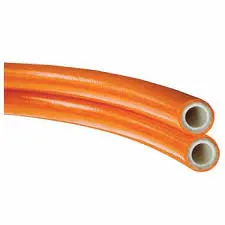Nov . 25, 2024 21:09 Back to list
ce certification helical metal hose product
Understanding CE Certification for Helical Metal Hose Products
In today's global marketplace, ensuring the safety and reliability of industrial products is paramount. Among various components used in mechanical systems, helical metal hoses have gained popularity due to their flexibility, durability, and resistance to various environmental challenges. One important aspect of marketing and utilizing these products in Europe is obtaining CE certification. This article aims to explain the significance of CE certification for helical metal hoses and the processes involved in achieving it.
What is CE Certification?
CE marking is a certification mark that indicates conformity with health, safety, and environmental protection standards for products sold within the European Economic Area (EEA). The CE stands for Conformité Européenne, which translates to European Conformity. Products that bear this mark are deemed to comply with EU legislation, enabling manufacturers to market their goods in member states. For helical metal hoses, this not only assures compliance with European guidelines but also enhances the product's credibility and consumer trust.
The Importance of CE Certification
1. Legal Requirement For many products, particularly those used in critical applications such as the chemical, oil, and gas industries, CE marking is a legal requirement. It signifies that the product meets the essential requirements of the relevant European directives.
2. Market Access Obtaining CE certification opens the door to selling products across the EEA. Without this certification, products may face restrictions, increased scrutiny, or outright bans in specific markets.
3. Consumer Confidence The CE mark serves as a symbol of quality and safety. By displaying this certification, manufacturers can enhance their brand reputation, and customers feel more assured about the reliability of the products they purchase.
4. Risk Reduction Companies that comply with CE standards minimize the risk of accidents and failures, thus protecting both their employees and customers. This proactive approach can lead to fewer liability issues and legal disputes.
Steps to Achieve CE Certification for Helical Metal Hoses
ce certification helical metal hose product

1. Identify Relevant Directives The first step toward obtaining CE certification is understanding which EU directives apply to helical metal hoses. Typically, this would include directives related to machinery safety, pressure equipment, and possibly others, depending on the application.
2. Conduct a Risk Assessment A comprehensive risk assessment helps identify potential hazards associated with the product's use. This assessment must consider various factors, including the materials used, the environment of application, and operational conditions.
3. Compliance with Standards To ensure compliance with relevant directives, manufacturers must adhere to harmonized European standards. These standards outline the safety and performance requirements for helical metal hoses. It is crucial to stay updated on any changes or updates to these standards.
4. Product Testing and Quality Control Rigorous testing must be carried out to ensure that the helical metal hoses meet the required specifications. This may involve tensile tests, pressure tests, and other assessments to verify performance and durability.
5. Technical Documentation Manufacturers must prepare a technical file that documents the design, production, and testing processes of the product. This file serves as evidence of compliance and may be requested during inspections.
6. Declaration of Conformity After ensuring that the product meets all necessary requirements, the manufacturer must declare conformity and affix the CE mark to the product. This declaration should accompany the technical documentation.
7. Monitoring and Surveillance Once CE marking is obtained, continuous monitoring of the product's performance and compliance is necessary. This may involve periodic audits and reviews to ensure ongoing adherence to standards.
Conclusion
CE certification for helical metal hoses is not merely an administrative requirement; it represents a commitment to quality, safety, and consumer trust. As industries become increasingly globalized, manufacturers that prioritize compliance with CE standards will likely gain a competitive edge. By understanding and implementing the necessary steps toward CE certification, businesses can ensure that their helical metal hose products are recognized as safe and reliable across the European market.
-
Best Four Steel Wire Spiral Hose Hydraulic R12 – Durable High-Pressure Hose Manufacturer
NewsJul.08,2025
-
High-Quality 1/4 Hydraulic Hose – Soft, Flexible & Durable Rubber Hoses for Industrial Use
NewsJul.08,2025
-
1 1 2 Inch Hydraulic Flexible Hose - Durable, Reliable, High-Pressure Solutions
NewsJul.07,2025
-
High-Quality 1 2 Rubber Hose - Durable, Flexible Hydraulic Solutions
NewsJul.07,2025
-
Discover SAE Hydraulic Hose Types - High Quality & Durable Hoses from Leading Factory Supplier
NewsJul.06,2025
-
High Pressure Wire Hydraulic Rubber Hose Supplier Durable & Reliable 1SN Hose Solutions
NewsJul.06,2025
